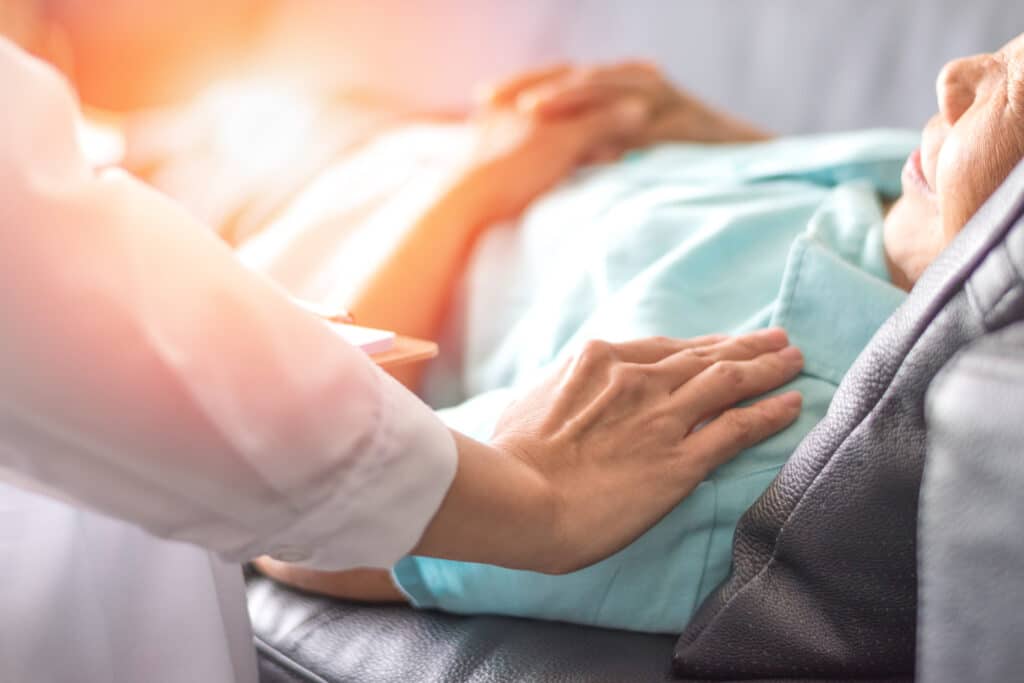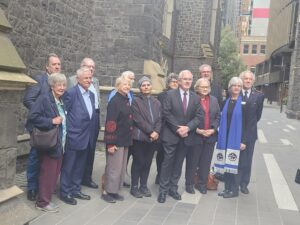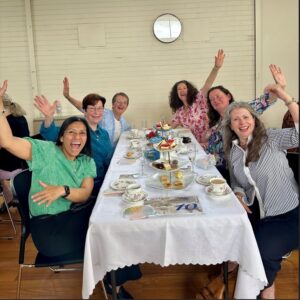
Dawn Treloar
24 August 2024
“Seeing you again helps me to stay positive when I get re-admitted to hospital”
She tells me about her health issues, her family and how she is managing with being in hospital again. I listen ask appropriate questions and hold her story.
“Can we spend some time in prayer?”
This interaction occurred recently with an 86-year-old woman who had regularly attended her parish church until she was no longer physically able to get to church. She now only receives communion when in the Royal Melbourne Hospital. She prays faithfully every morning and night and misses fellowship with other Christians.
“Thank you so much for this Memorial Service. I have learnt so much about grief and being here with others who are grieving has helped me. Hearing about the grief process has helped me better understand what I am experiencing and it was all so respectful and beautiful. Thank you.” – Feedback after an RMH Memorial Service for the families of those who have died whilst inpatients.
The face of healthcare chaplaincy is changing. In hospitals Anglican chaplains are now just known as members of the Spiritual Care Team. There are also fewer specifically Anglican Spiritual Carers embedded in our hospitals due to funding cuts by the state government, hospitals and the diocese.
Read more: An outstanding book, exemplifying the role of Christian health professionals
It is within this context that I look forward to healthcare chaplaincy being discussed at Melbourne’s upcoming synod. The working group that was established by last year’s synod to report on this area to Archbishop in Council and synod has worked hard to clarify the current situation and plan for the future.
Giving funding limitations we hope to encourage people to consider leaving an endowment that could help build up a corpus of money. This would enable the diocese to provide embedded Anglican chaplains, or Spiritual Carers, within at very least Melbourne’s three trauma hospitals: the Royal Children’s, Royal Melbourne and the Alfred.
There are 144 public and 81 private hospitals in Victoria. We, the Anglican Diocese of Melbourne, have 14 chaplains in major Melbourne and Geelong hospitals and multiple in smaller public hospitals, health services and residential aged care. None of these are paid by the diocese. Two are funded by donations from the Melbourne Anglican Foundation and one via grants through a hospital foundation.
In an ideal world this important ministry would provide an Anglican presence in all major hospitals. Realistically it would be great if there was an embedded full-time Anglican presence in the three trauma hospitals.
As we plan for the future of healthcare chaplaincy in the diocese the focus has shifted to training clergy and laity in the skills needed to provide sensitive and appropriate care for people in hospital and aged care facilities.
The evolving role of coordinator of healthcare chaplaincy is to encourage those currently embedded within our hospitals, look for alternate means of providing embedded Anglican chaplaincy and maintain awareness of the need for chaplaincy to those who are hospitalised or in residential aged care. This means lobbying hospitals, government for funding, and ensuring those in need of Anglican spiritual care have their needs met in a timely manner.
Read more: ‘Green light’ to scout hospital chaplaincy ideas lifts outlook
My goal is to see healthcare chaplaincy acknowledged as a vital part of the ministry of the Anglican Church to those who may never walk into a church, to faithful Anglicans who have been unable to get to church for years due to infirmity and to other faithful Anglicans.
If you or a loved one are in hospital or a residential aged care facility you need to approach their nurse and ask for a member of the Spiritual Care team to attend – if a specific religious ritual is desired please make this clear to the staff so they can facilitate it.
There is little more sacred than to spend time in prayer with those who are struggling with their own or a loved one’s physical unwellness – to witness the pain or stress lines on their face dissolve as their bodies relax and their soul connects with God.
The Reverend Dawn Treloar is coordinator of healthcare chaplaincy for the Anglican Diocese of Melbourne.
For more faith news, follow The Melbourne Anglican on Facebook, Instagram, or subscribe to our weekly emails.







